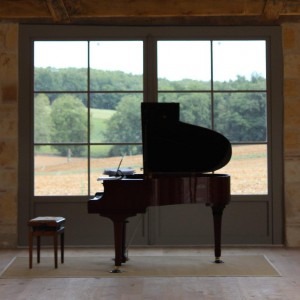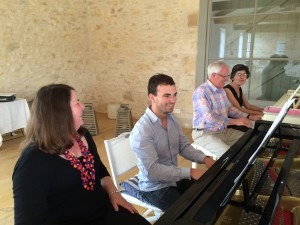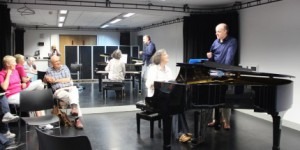
La Balie, France
So what is the attraction of a piano course? I think most adult amateur pianists would agree that in addition to the opportunity to study with some top-class teachers and international concert artists, the social aspect is very appealing. As pianists we spend a lot of time alone with only dead composers (mostly) and that box of wood and wires that is our instrument for company. Many of us like the solitude, but it is also important for us to connect with other pianists. A course is one of the best ways to meet other pianists, to hear one another play, share repertoire, receive expert tuition in a friendly and supportive atmosphere, indulge in piano chat, and have fun. I have formed firm, lasting friendships with people I have met on piano courses, and some of us return year after year because we gain so much from the experience. If you are preparing for an exam, diploma, competition or audition, a course is also a great way of receiving invaluable feedback from a skilled teacher and the other participants, and is an opportunity to run a programme by an informal and sympathetic audience ahead of the big day.

Students at La Balie
Another excellent benefit of piano courses is the chance to share and explore new repertoire. On every course I have attended I have discovered new music, from Cyril Scott’s sensual ‘Lotus Land’ to works by contemporary composers such as Stephen Montague and Peteris Vasks. I’ve even attended a course where one of the participants performed his own compositions, written for his young daughter and played with warmth and affection.
And then there is the opportunity to perform, which for many amateur pianists can be one of the most daunting things one will ever do, and also one of the most rewarding and inspiring. Performing to a group of people whom you have got to know over the course of a weekend or a week-long course allows you to perform in a ‘safe zone’, and can be less stressful than a more formal concert setting. The preparation, both musical and emotional, is the same, but it can be hugely less nerve-wracking, and there are usually opportunities to discuss aspects such as memorisation, organising page turns, managing performance anxiety and strategies for coping with nerves.

A class at the Summer School for Pianist, Walsall, UK, with pianist James Lisney
For many, piano courses are the pianistic equivalent of going on a retreat, and in addition to the very useful advice and skills one picks up during the course, one returns to one’s piano at home with renewed enthusiasm and focus. And playing for one another at a course also reminds us of the primary reason why music was created in the first place – for sharing with others.
List of piano summer schools and courses 2016




